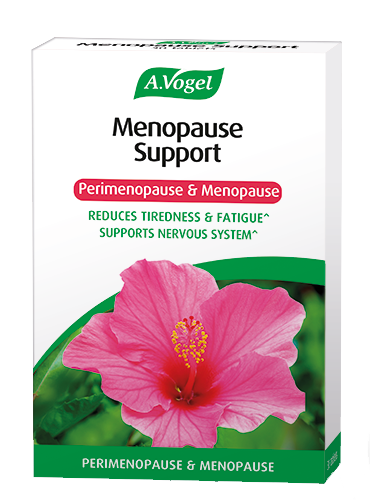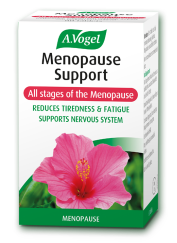Today's topic
Today on A.Vogel Talks Menopause, I'm going to be talking about motherhood and parenting during the menopause.
Here, I'm talking about women with young children and teenagers, rather than those of us whose children have already left home and are living their own lives.
Statistics show that women are now getting older before having children. This could be due to the fact that they're enjoying their careers or even just living life to the full before settling down and becoming parents. But, according to the Office of National Statistics, in 2018, the mean age of women at childbirth was 30 years old.
Thirty-two percent of women were between 30 and 34, but 55% of women who gave birth were over 30 years old.
The challenges of raising a child during menopause
What's happening here is that a lot of women are either starting the menopause while raising young children, or they're starting the menopause alongside their teenagers who are just going through puberty.
So, as you can imagine, this is creating a lot of challenges that, many years ago, the majority of women didn't have to face. So, how are you going to cope with this?
Taking care of a toddler during menopause
If you have young children, especially little toddlers, my goodness, you've got them running around, they're full of energy, they're probably not sleeping a lot. And, here you are, you're probably very tired, maybe you're not sleeping well if you're getting hot flushes and sweats. And, can you keep up with them if you're getting joint aches and pains?
There can also be a lot of stress involved, so you've got not only the stress of the menopause, but also the stress of looking after young children.
Puberty and menopause in the same house
Now, for those of you who have teenagers going through puberty, I have been told that this can be a difficult relationship.
You've got mums going through the menopause with all the emotional angst that's going on - the mood swings, the low mood, the anxiety, the tearfulness. And, this can be made even more difficult, especially if you've got a teenage girl who is going through exactly the same thing.
Many women tell me that it's extremely difficult to relate to them because you're both, very often, on the same page experiencing exactly the same symptoms, but just a good few years apart.
In this instance, you've obviously got the emotional chaos, but you've also, again, got the fatigue.
You may have the irritability. You may have the lack of patience. And a lot of mums tell me that they find it really difficult coping with their teenager's behaviour.
I was doing a workshop not long ago and one of the women there was saying that she is actually living in a household full of men because she's got two teenage sons. And she is finding it very difficult trying to explain to them how she's feeling and why their once very calm and capable mum is now jumping off the deep end.

How to take care of yourself and your children during menopause
This situation can create a lot of unplanned symptoms. So, how are you going to cope with all this?
Take care of yourself
It's really important to take care of yourself, and please don't neglect your own mood. You know, if you're on an airplane, you're told: "When oxygen masks come down, you must put your own on first before helping other people". And it's the same here.
The menopause causes fatigue amongst all sorts of different symptoms. And, if you are really tired, if you are totally run down, if you have nothing left, then it's going to be very difficult for you to care for the family and to look after both young children and teenagers. So, looking after yourself is not being selfish. It is a really, really important priority here.
Talk about it
Don't forget to talk about it. Again, as women, we tend to keep multi-tasking and pretending that we can cope. And, you know, the last thing we're going to do is ask for help because it will look like we're weakened, and we can't cope. But it's really important to ask for help in this situation if you're really struggling.
So, don't see it as a sign of weakness. It's a sign of being strong if you're willing to just say to people, "Look, I need a little bit of a hand here." Remember to communicate with your family. Like the lady with the two teenage sons, they have no idea what's happened to their mum. And it's the same with partners, it can be the same with children and your friends, too.
So, maybe sit them down in a quiet moment and just explain that this is not a permanent situation, but something's happening. Your hormones are changing and you would love it if they could help and support you rather than arguing and giving each other a really hard time.
Make time for yourself
"Me" time is so important. And I know you'll all be sitting there going, "Where am I going to fit that in?" But this is something that needs to be included in your self-care routine. It's just having a little bit of "me" time to allow your body to cope, to re-energise, and recuperate, too.
Balance your hormones
You can also look at balancing your hormones if it's appropriate. You could try our Menopause Support, or you could look at some of the other remedies and supplements that might help you to cope either physically or emotionally.
A.Vogel Menopause Support | For Perimenopause, Menopause & Postmenopause Symptoms
£8.99 (30 tabs) In Stock
Support your nervous system
Again, this is going to help, especially for the teenage angst that's going on beside you.
Look at things like magnesium, your B vits as well. These are all going to help you just to cope that little bit better.
Don’t ignore your symptoms
But don't ignore your symptoms! We're finding now that, for a lot of women, there is so much pressure going on in their lives that it's getting to the point where they are getting either totally fatigued, or else they're verging on depression.
These symptoms should not be ignored, and I always say to people, "If you're worried about any of the symptoms that you have, please just discuss this with your doctor to make sure that nothing else is going on. Don't always blame everything on the menopause."
Eat well
And the other really important thing here is to eat well. Make sure that you're getting a good, nutritious diet to help support your body generally. And don't forget the water because that's going to help with all your symptoms, too.
For those of you out there who are grandparents, who are looking after younger children (and that can also be a really difficult task), all these self-help and care tips will be relevant to you as well. You need to look after yourself, too. I know very well how tiring young children can be when you're looking after them!










